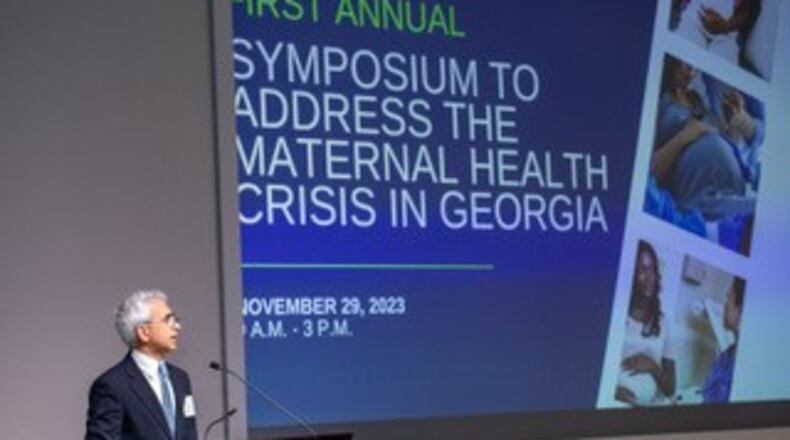Doctors who care for pregnant women and new moms may hesitate to treat patients with mental health conditions, a leading cause of pregnancy-related deaths, because of a lack of experience and formal training, according to Atlanta OB-GYN Andrea Braden.
Considering more than 75% of pregnant women in the country with mental health symptoms never receive treatment and that mental health conditions account for nearly 23% of pregnancy-related deaths, Braden said she’s surprised more doctors aren’t sufficiently trained to comfortably identify and treat pregnant patients with mental health challenges such as substance use disorder and post-traumatic stress disorder, anxiety and depression.
Substance use disorders and suicide are among the mental health conditions that contribute to pregnancy-related deaths, according to the Centers for Disease Control and Prevention.
“We focus so much on hypertension and hemorrhage” as major factors contributing to maternal mortality, Braden said. Meanwhile, mental health concerns traditionally haven’t received as much attention, she added.
“We are often not aware where patients can get help, where to send them,” said Braden, medical director of the Atlanta Birth Center, a nonprofit that operates a freestanding, nationally accredited center in the city offering homelike care. “Many moms are suffering and falling through the cracks.”
Recent Emory University research into the link between mental health and maternal health may offer Braden and other health care providers better guidance for how to diagnose and treat patients with mental health disorders. Researchers hope their studies also will improve maternal mental health, convince government policymakers to fund treatments for mental health disorders and change policies regarding health and welfare services.
Georgia’s rate of preterm births, infant and maternal mortality are higher than the national average. And last year, the nonprofit Policy Center for Maternal Mental Health graded Georgia an F based on its provider infrastructure, screening and reimbursement policies. Part of the problem is that more than 40% of Georgia’s counties are maternity care deserts that lack maternity care resources such as obstetric providers or a hospital or birth centers offering obstetric care such as the one Braden directs.
In one study published in JAMA Health Forum in July, researchers from Emory’s Rollins School of Public Health and Vanderbilt University found opioid treatment can keep newborns with their mothers and out of foster care. Substance use disorder as a mental health disorder affects moms and babies, said Stephen Patrick, the study’s senior author and chairman of the Rollins Department of Health Policy and Management.
Medication to treat opioid use disorder reduce the risk of maternal overdoses and death and make it less likely that newborns will be born too early, according to the National Institute on Drug Abuse.
Emory researchers found that newborns exposed to opioids were more likely to be discharged from the hospital with their mothers if the mom received medication for opioid use disorder.
The study analyzed the births of opioid-exposed infants born at Vanderbilt University Medical Center in Nashville,Tennessee, between 2018 and 2022 who were at least 35 weeks of development and didn’t have critical illness.
Among 459 mother-infant pairs, 362 mothers received medication for opioid use disorder and 350 infants were discharged home with their biological mothers. The others may have been discharged home to another family member, put into foster care or adopted, according to the study.
The study also uncovered inequities associated with opioid use disorders, treatment and foster care. Black women were less likely to receive medicine for their disorder than white mothers, the study found.
Patrick, a neonatal intensive care doctor, studied similar issues at Vanderbilt. His research contributed to a 2022 White House report on how to address substance use disorder in pregnancy as part of a broader effort to improve maternal health.
The report outlined actions the administration would take to improve access to treatment for pregnant women with substance use disorders and prevent unnecessary foster care placement, among other goals. Patrick, who served as senior policy adviser to the White House Office of National Drug Control Policy, said many of those changes occurred.
In another Emory study, researchers from its School of Medicine and the University of Missouri Kansas City are evaluating PTSD in pregnant Black women, a population at high risk for trauma-related mental health issues.
The research is an outgrowth of the Grady Trauma Project, which has studied trauma and related mental health disorders in urban areas, particularly among disadvantaged communities, for nearly 20 years. About 50% of that population experience PTSD in their lifetime compared to the national average of about 10%.
PTSD can result from traumas, including childhood abuse, neglect, sexual abuse or assault and community or neighborhood violence, said Briana Woods-Jaeger, one of the study’s principal investigators and an associate Rollins professor.
Women who have experienced PTSD are helping to guide the research and indicated pregnancy was a prime time to study the disorder and its impact on maternal health, she said.
Earlier this year, the Patient-Centered Outcomes Research Institute awarded researchers $6 million for the five-year study, which began in July. It will involve 804 trauma-exposed pregnant Black women ages 18 and older in their first trimester of pregnancy.
The research could help urban obstetrics clinics screen for mental health disorders to improve maternal mental health and reduce negative birth results such as preterm birth rates and low birth weight, Woods-Jaeger said.
About the Author
Keep Reading
The Latest
Featured



